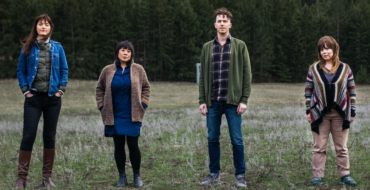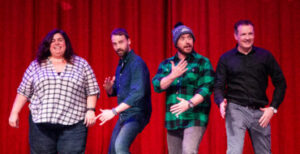If you were asked again in a decade, how would your answers change? Maybe the connection between your present and future self would be obvious, every year a link in a sturdy chain. On the other hand, there could be tangles—fractured links and stretches covered in rust.
Ten years ago, four artists asked 100 people, aged 1 to 100, about life, belief, and the future. The artists held follow-up interviews with the people from the original performance, at least those that could be found and had not passed on. The result is Kismet, things have changed, a production of Vancouver-based theatre company, The Chop, and part of the PUSH International Performing Arts Festival.
If you’ve ever opened your younger self’s diary—and experienced the uncanny sensation of falling backwards into old hopes and fears—you’ll have a sense of what Kismet is pursuing. During the performance, we get many recorded snippets of people’s lives from ten years ago and from now. Sometimes a person will answer much the same, even using the same phrases and other times the connection between past and current selves is less apparent. There weren’t as many through-lines as you might expect, but those that were presented offered a voyeuristic thrill—like eavesdropping at a bus stop, jumping forward in time, and overhearing a bit more of the conversation.
A decade ago, the performers of Kisment were also in different places in their lives. They begin this show by reflecting on what they’d hoped for versus what had come to pass. A few had hoped to make it as artists but had since changed into more conventional careers. Some had started families. Some had lost parents. The artists’ reflections are interspersed with recordings, reenactments, and video of the follow-up interviews. We hear from a few characters in some depth including Judy, an elderly woman from Prince George. When she was first interviewed, Judy expressed a fear that she might never leave Prince George for a place with a more temperate climate, perhaps Vancouver Island. Her husband, however, didn’t want to leave. Ten years on, Judy is still in Prince George, but her husband has since passed away. When you’ve been in a place so long, Judy says, “You may as well like it.”
From then to now, many have lost loved ones. Uncle Jack, (played by his grandnephew, Daryl King, in a reenactment of their interview), has lost many, the use of his legs and much of his memory. He tells us that he used to be married. “She was a wonderful woman and I never remarried…or did I?”
If there is a lesson in Kismet’s collage of memories, it is this: we will remember family, friends, and our own shortcomings most clearly.
The voices of children provide an uplifting current. Asked what they are most looking forward to, a two-year-old says “get frog.” A six-year-old says they are looking forward to “being the boss”.
There might have been more interviews. Perhaps it was difficult to reconnect with interviewees or perhaps most gave curt answers. The big issues, death, birth, had a voice, but we heard less often from those in their middle-years (the actors aside). In setting its sights on the big questions, Kismet seems to have missed out on a wealth of detail.
That said, the sheer scope makes for an interesting production. Kismet will start you thinking about the big questions, about time, about what matters most, about whether we remain the same or whether we each play many parts. It will start you thinking about entrances and exits.
Like life, Kismet is sometimes funny, often sad, and ends somewhat unexpectedly. It plays at the Cultch’s Historic Theatre until February 8th.









